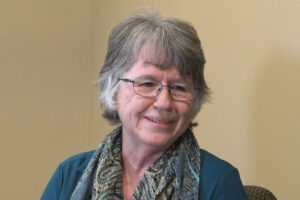Topic: Kansas Natural Resources Council (KNRC)

Interview of Mary Fund, February 10, 2020
Interviewed by Rex Buchanan
In her 2020 oral history interview, Mary Fund talks about her involvement in water policy from the perspective of her work at the Kansas Rural Center (KRC) since the late 1970s. Fund authored Water in Kansas, A Primer, published in 1984 by the KRC. In this interview, she talks about the difficulty of making changes in farming methods that will conserve both water and soil when those changes require farmers to voluntarily alter decades of entrenched farming practice. Fund also observes that shifting the political culture is key to making voluntary changes work.

Interview of Joyce Wolf, November 15, 2019
Interviewed by Rex Buchanan
During her 2019 oral history interview, Joyce Wolf talks about her background working with environmental organizations on a variety of environmental issues. With a degree in bacteriology, she became interested in water quality issues before the creation of the U.S. Environmental Protection Agency (EPA). Wolf worked with Jan Garton, a key figure in environmental advocacy in Kansas, and a coalition of environmental groups supporting water rights for the Cheyenne Bottoms wetland area under the banner of “Save Our Bottoms.” Wolf was also involved in debates over the low-level radioactive waste disposal facilities. She elaborates in this interview on the Show Moresuccess of the coalition achieving an arrangement for adequate water supply for Cheyenne Bottoms and funding of the State Water Plan during the administration of Gov. Mike Hayden. Wolf recalls that environmental organizations were also concerned about the silting-in of the federal reservoirs, the decline of the Ogallala aquifer, the conflict over the Arkansas River that led to the Kansas v. Colorado lawsuit, and the loss of surface water in western Kansas. Wolf also discusses the cultural differences between Kansas and Minnesota that appears to reflect a lack of appreciation of the natural environment in Kansas. Show Less

Interview of Janis Lee and Laura McClure, May 20, 2024
Interviewed by Rex Buchanan
Janis Lee and Laura McClure, both Democrats elected from predominantly Republican districts that overlapped, often campaigned together and conducted constituent communication sessions in the areas they both represented. Because their time in the legislature (1989-2011) and their largely rural districts in northcentral Kansas intersected, Lee and McClure both worked on a wide range of policies pertinent to the Energy & Environment Collection of oral histories: confined feeding facilities, solid waste, waste tires, water quality standards, the Kansas v. Colorado lawsuit, and the Water Transfer Act that the city of Hays was exploring at the time of this interview, among Show Moreothers. In the energy arena, significant issues during their time of service in the Kansas Legislature included retail wheeling of electricity, gas pollution remediation, well plugging, and gas-gathering systems regulations. In this May 2024 interview, they explore those issues, the dynamics of the legislature, campaigning, and the work involved in serving in the legislature. Show Less

Interview of Bruce Snead, September 3, 2024
Interviewed by Rex Buchanan
This interview of Bruce Snead, former Director of the Engineering Extension Program at Kansas State University, focuses on his career and contributions to energy policy in Kansas beginning when he moved to the state to take a position with the university. Snead reflects on the complexity of the history of unsuccessful attempts to establish an independent energy policy entity in Kansas. His perspectives on state action were colored by his years of service as a non-partisan elected member of the Manhattan, Kansas City Commission and Mayor, as well as his involvement in a number of statewide energy planning Show Moreefforts where he saw the importance of individuals to policy development and implementation.
Highlights -- short excerpts from the interview
